 Probably the first on the list of healthy shopping tips for the grocery is to always eat before you go. While the family-size Doritos or big bags of M&Ms will still look good, you’ll be full enough to resist buying them. If they aren’t in the house, you’ll be far less likely to eat them. With that said, also remember to include on your list some options for healthy snacks. They’re just as important for weight loss as they are for good health.
Probably the first on the list of healthy shopping tips for the grocery is to always eat before you go. While the family-size Doritos or big bags of M&Ms will still look good, you’ll be full enough to resist buying them. If they aren’t in the house, you’ll be far less likely to eat them. With that said, also remember to include on your list some options for healthy snacks. They’re just as important for weight loss as they are for good health.
You don’t always have to have fresh fruits and vegetables to get the most nutrients for your dollar.
While fresh vegetables look delicious and taste that way, too, if you’re cooking a meal, frozen or canned veggies will do. In most cases, they are healthy, as long as the only ingredient is the vegetable. In the case of canned veggies and fruit, water packed without added sugar or salt is okay. Frozen fruits and vegetables may actually be healthier. That’s because they’re processed right from the field. Unlike fresh veggies that often have to travel miles to the grocery, then sit on the shelf until you buy them, they aren’t picked early and are far fresher.
Save money and only get organic fruits or vegetables on the Dirty Dozen list.
The EWG—Environmental Working Group—samples hundreds of conventionally grown fruits and vegetables from around the country, looking for higher levels of 230 different pesticides. The produce is washed thoroughly and sometimes peeled, then tested. If the level of these chemicals. Is high, they’re placed on the Dirty Dozen list, which has grown for some years to the Dirty Dozen plus one. If they show no signs or minimal amounts, they are placed in the Clean 15 group. Fruits and vegetables on the Clean 15 list don’t need to be organic to be low in pesticides or pesticide-free, so you can purchase the cheaper non-organic variety.
Read the label!
Look for added sugar and high sodium levels and avoid those products. For instance, peanut butter should only have one item, peanuts. The fewer the ingredients, the better. Remember, if you can’t pronounce the ingredients or it looks like a chem lab exam, it shouldn’t go in your shopping cart. Read the labels and opt for the ones that are lower in sodium, added sugar and saturated fat.
- Plan your meals for the week and do meal prep on the weekend. Make a shopping list and stick with what’s on the list. It helps to save money by using leftovers and saves time by cooking everything at once.
- Always check the use-by date on the label. If it’s close to expiration and you’re using it right away, it’s not a problem. Recently, many people have found items on the shelves past use-by dates, which may have occurred due to shipping problems.
- If you’re buying canned chicken, meat or fish, make sure it’s packed in water, not in oil. Check the label to make sure it doesn’t contain salt or at least has a lower sodium level.
- Most tree nuts and seeds are healthy options that add extra protein to your diet. If you find them at a low price, stock up. You can store extras in air-tight containers or freeze them. For example, pecans can be frozen for up to two years.
For more information, contact us today at Next Level Fitness
